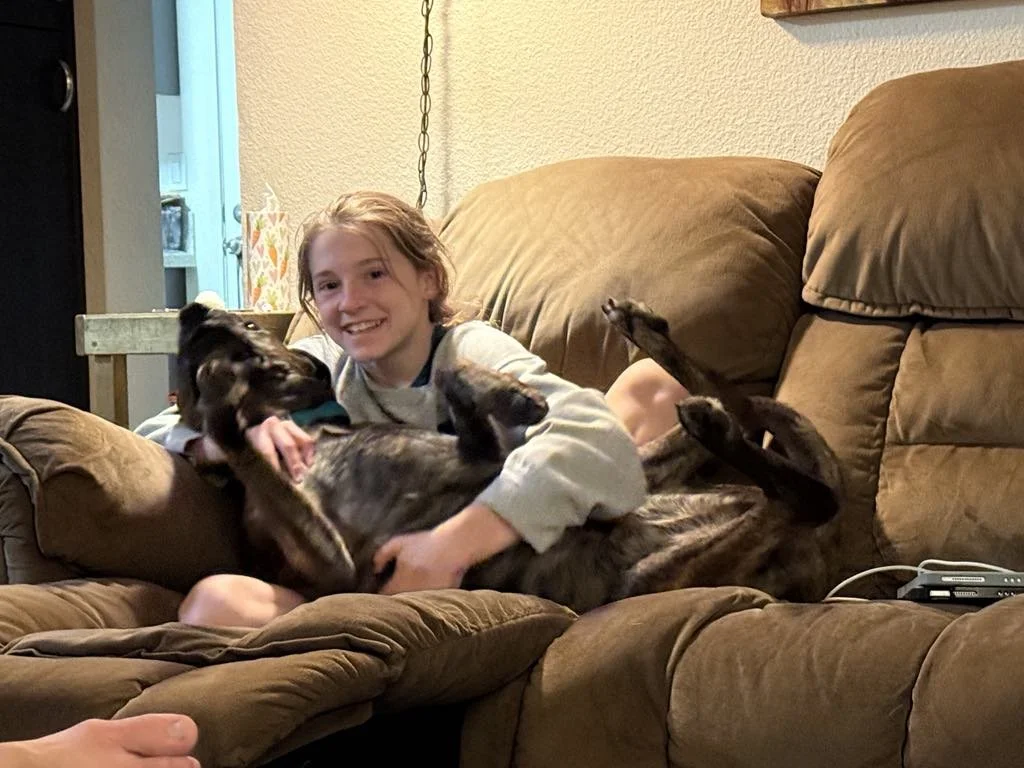“What’s Wrong with Me?”: When One Child Learns Differently Than the Rest
My oldest & her favorite living thing, May 2025
When we began homeschooling, my oldest daughter was finishing second grade. Like many new homeschool moms, I jumped in with read-alouds, hoping to build a love for learning in all three of my children—who were close in age.
But within just a few months, I started noticing something that quietly unsettled me.
Whenever I paused to ask for a narration, it was clear: her younger siblings could recall details, explain ideas, and track the storyline with ease. My oldest—bright, kind, and eager to please—began looking to them for cues. She leaned on their words to fill in the gaps of her own understanding.
As the years went on, the disparity grew more obvious.
The Hidden Work of Scaffolding
Most of my homeschool energy slowly shifted toward her. Not because she needed more content or extra challenge—but because she needed a different kind of support.
She needed:
Help focusing when distractions overwhelmed her
Systems for remembering multi-step tasks
Repetition and patience as she tried to internalize basic skills
Freedom to learn at a different pace—and still feel dignified in the process
While her siblings thrived with open-ended assignments and could move through lessons independently, I was constantly reworking the structure to give her more time, more modeling, and more check-ins.
The Day Everything Broke Open
Last summer, I sat down to assess some foundational skills: typing, geography, cursive, and spelling. I was deciding what needed to carry over into the next school year.
When the kids saw their typing results side by side, it became painfully obvious to her—she was the only one still unable to type without looking at the keyboard.
She ran out of the room—angry, embarrassed, overwhelmed.
I followed her. We ended up in the garage, just the two of us, and through tears, she looked at me and asked:
“What’s wrong with me?”
“Why do I have to work so much harder than they do?”
“We’ve all done the same lessons. I’ve worked just as hard. Why can’t I do what they can?”
My heart shattered.
When the Gaps Come Into Focus
Sitting there on a box in the garage, I gently told her something I’d quietly suspected for years: ADHD.
She was surprised, but not confused. The pieces made sense.
I explained that doctors had previously told us the label wouldn’t matter unless we wanted to medicate. She always scored above grade level. To the outside world, there wasn’t a clear struggle. But inside our home—next to siblings who learned quickly and effortlessly—her internal battle was obvious.
Now that she was 14, I believed she was old enough to make this decision for herself.
“There are meds that might help. You don’t have to try them—but you can. This is your brain. Your call.”
She said yes.
Diagnosis & Discernment
We scheduled the assessment. Over the next few months, we filled out questionnaires, sat through evaluations, and met with psychologists.
The diagnosis came back: ADHD.
We tried medication. It worked beautifully—until her appetite disappeared. We switched meds. Again, the clarity and focus returned—until day three, when she stopped eating.
So we paused. She reflected. And then she made another decision.
She didn’t want to be medicated unless she truly needed it.
We just had our final psychology appointment before the big move, and she told them—with total confidence—that she didn’t want to try another medication. She believed she could handle the move, her new gym, and starting homeschooling high school (with all that entails) without it.
She knows how to advocate for herself. She knows she learns differently. And she knows that doesn’t make her less—it makes her resilient.
She is the hardest worker I’ve ever met. Not because it comes easy, but because she shows up anyway.
Why I’m Sharing This
If you’re homeschooling a child who isn’t keeping pace with their siblings… If you’re quietly carrying the weight of individualized planning while juggling the rest… If you've heard whispered questions like “What’s wrong with me?” behind closed doors…
You’re not alone. Your child is not alone. And there is nothing wrong with needing more time, more support, or a different path.
There’s beauty in that journey too.
And I see you.
Ready for Practical Help?
If this story hit close to home and you're looking for real strategies to support your differently-wired learner, I’d love to share what’s worked in our home. From scaffolding tools to mindset shifts, you don’t have to figure it all out alone.

